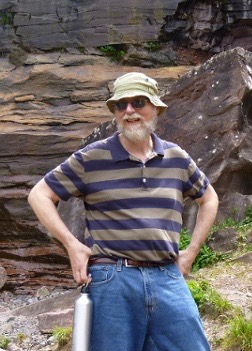
09 Jul TSRC’s Town Talk: Fake Science & Water
Professor Kenneth Jordan speaks at the Telluride Conference Center, Tuesday, July 11, 6 p.m., part of Telluride Science Research Center’s (TSRC) Town Talks in Mountain Village. His subject: water, fact and fiction. Admission is free; cash bar opens at 5:30 p.m.

Professor Kenneth Jordan on Bear Creek. On July 11, he separates fact from fiction about water.
Just imagine…
A process that converts water molecules to a high-energy state, allowing us to burn water as fuel. Presto! Energy crisis solved.
Tiny rings of water molecules that are far easier for your cells to absorb, increasing hydration and improving your overall health.
Water molecules able to “remember” the presence of another substance even after it’s gone?
Sound pretty amazing, right?
Only one problem: none of the above is true.
Water is critical to life on Earth and while we understand a great deal about H2O, there are still things many things we don’t know.
A number of companies have managed to capitalize on using water pseudoscience to sell their products – like the magic water rings or the “high-energy” molecules mentioned above.
Many products that involve water in some “altered form” rely heavily on pseudoscience—that is, nonscientific reasoning masquerading as science.
And pseudoscience has paid off big time, helping to create a multi-million dollar industry.
A few years ago, Professor Kenneth Jordan was surprised to find that an article pushing pseudoscience had actually used his name and research to justify faulty claims.
“A high school student in Germany contacted me about an article explaining homeopathy in which my name had been cited,” explained Professor Jordan, the Richard King Mellon Professor and Distinguished Professor of Computational Chemistry and Co-Director of the Center for Simulation and Modeling at the University of Pittsburgh.
Professor Jordan, whose research group at the University of Pittsburgh focuses on water in a scientific setting, soon became interested in the pseudoscience plaguing his field.
Why exactly?
According to Professor Jordan, “We live in a world where understanding pseudoscience is increasingly important; water pseudoscience in general is harmless, but when it comes to climate change and other matters of greater importance, scientific accuracy is crucial.”
What’s more, in an era of sensational and fake news, distinguishing fact from fiction is increasingly important. Just because you read something or see it on the nightly news does not make it true; the same goes for science.
“We need to do a better job of communicating to people what science is all about,” explained Professor Jordan.
And TSRC is helping to accomplish just that, for “many TSRC scientists,” said Professor Jordan, “have made significant contributions to our understanding of water.”
In this week’s TSRC Town Talk, titled “Water: Separating Science from Pseudoscience,” Professor Jordan delves deeper into the world of water pseudoscience, exploring many examples of science gone wrong.
To learn more about debunking the myths about water, come to the Talk on Tuesday, July 11, 6 pm in the Telluride Conference Center in Mountain Village. A cash bar opens 5:30 p.m. Admission is free to anyone.
TSRC Town Talks are a series of weekly talks for the public in Telluride, sponsored by the nonprofit Telluride Science Research Center. Over 1,400 scientists from all over the world come to Telluride each year to discuss new ideas and build research partnerships. You can learn more about TSRC and its current work at www.telluridescience.org.


Sorry, the comment form is closed at this time.